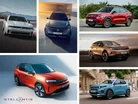How Stellantis is Gearing up for a Green Future

As organisations across the globe strive to achieve various climate goals, embracing the transition to electric vehicles has become an imperative.
However, while EVs reduce greenhouse gas emissions, improve air quality and decrease reliance on fossil fuels, their adoption has been far from simple.
In its latest sales performance report, automotive giant Stellantis highlights its recent ability to meet new EV vehicle requirements across Europe, reporting a 12.5% share in the EU29 and a 1.2% sales growth in battery electric vehicles (BEVs).
Despite the automotive industry experiencing significant decline, Stellantis is emerging as a resilient force that can evolve to meet changing automotive demands.
The company’s success in achieving this growth can be attributed to its vast range of BEV, PHEV, and MHEV offerings.
Stellantis: An automotive giant
Stellantis is a leading automotive company that consists of 14 automotive brands and two mobility arms.
The organisation strives to ‘lead the way the world moves’ by harnessing operational excellence, global diversity and a wide portfolio of brands.
Sustainability lies at the heart of Stellantis’ work, with the organisation working to cover the entirety of sustainable mobility and lead the charge in software development and electrification.
Stellantis is driven by its ‘Dare Forward 2030 strategic plan’, which outlines how the business will set an ambitious benchmark for the industry by striving to achieve carbon net zero by 2038.
First released in March 2022, the plan encompasses three vital pillars – care, tech and value – through which Stellantis will enhance its operations.
Carlos Tavares, CEO of Stellantis, says: "We are proud of our 100-plus year tradition and history, which show our grit, perseverance and staying power. Dare Forward challenges us to be so much more than we have ever been."
Through Dare Forward 2030, Stellantis aims to offer more than 75 full electric models by 2030, enhance its coverage of the EV market, double its net revenue by 2030 (vs 2021) and maintain double-digit adjusted operating income margins during the decade.
Stellantis' sales performance
Stellantis has reported significant success in its range of EVs in several countries in the EU29 perimeter.
Since the start of the year, the Peugeot e-208 has emerged among the best-selling EVs in France and, due to greater levels of production, the Citroën ë-C3 led the way in the French EV market in October 2024.
In addition to this, volumes grew by more than 10% in France, accumulating to more than 31% on a YTD basis.
However, it's not only in France that Stellantis has recorded impressive growth in its EV market, with sales rising by 16% in Belgium, 31.4% in Portugal and 12% in Poland.
In the UK, where the organisation is a pioneering electric van manufacturer, Stellantis recorded triple-digit growth, achieving a 188% rise in EV sales.
Jean-Philippe Imparato, COO for Enlarged Europe at Stellantis, explains how: "Despite a challenging and evolving market, Stellantis continues to prove its resilience and adaptability in Europe.
“Our strong growth in key electric segments and standout performance across several markets demonstrate our commitment to meet EU regulations, while protecting its own ecosystem, with the clear goal to deliver clean, safe and affordable mobility to our customers in Europe and beyond."
EV regulations across Europe
Several countries across Europe are adopting new regulations to increase the uptake of EVs in a bid to minimise environmental impact and utilise new government incentives.
In March 2023, the European Union welcomed a new law that meant that all new cars and vans that are sold in Europe from 2035 must be zero-emission vehicles.
UK Chancellor of the Exchequer Rachel Reeves also adopted a similar favourable approach to EVs in her Autumn Budget for 2024, announcing that EVs will keep their 'Benefit in Kind' tax rates for company car drivers, meaning they enjoy favourable tax conditions in comparison to internal combustion engine vehicles.
The Chancellor also pledged to tackle another prominent barrier in the form of public charging, announcing £200m more for EV charging infrastructure.
What's more, EVs will receive more beneficial first-year tax rates in the UK, but will now not be exempt from vehicle excise duty from April 2025. For example, zero-emission vehicles will only pay £10 for the first year compared to £110 for cars emitting less than 50g/ km of CO2.
Stellantis’ leadership in the EV market places the company in a secure position in the context of the automotive industry, amid constant change in EV regulation across Europe.
Make sure you check out the latest edition of EV Magazine and also sign up to our global conference series - Sustainability LIVE 2025.
EV Magazine is a BizClik brand.



